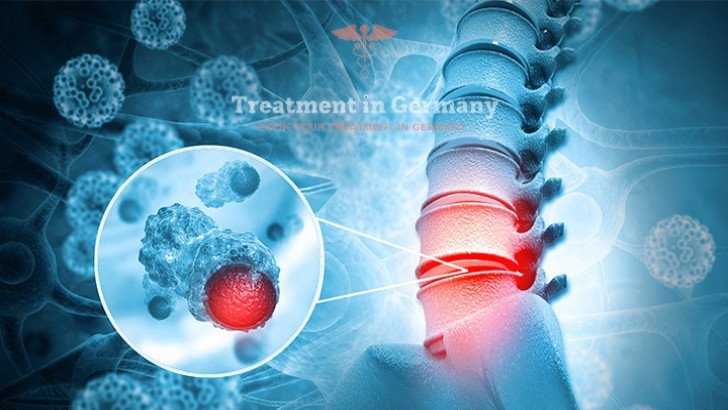
Germany, a global leader in advanced cancer care, offers innovative bone metastases treatments that enhance patient outcomes and quality of life, attracting individuals worldwide.
Bone metastases, a condition where cancer spreads to the bones from a primary tumor, significantly impact cancer patients by causing pain and reducing mobility. Germany, a global leader in advanced cancer care, offers innovative bone metastases treatments that enhance patient outcomes and quality of life, attracting individuals worldwide.
Bone metastases occur when cancer cells from primary sites, such as breast, prostate, lung, or kidney cancer, spread to the bones, leading to structural damage and complications like fractures or hypercalcemia. Risk factors include advanced-stage primary cancers, obesity, and genetic predispositions. While bone metastases are not curable, modern treatments focus on pain relief, preventing complications, and improving quality of life. German oncology centers and orthopedic departments excel in delivering innovative bone metastases treatments, integrating targeted therapies, radiotherapy, and surgical interventions to optimize survival outcomes.
Early identification of bone metastases symptoms is critical for effective management. Common signs include:
These symptoms significantly affect patient well-being, necessitating precise diagnosis. German specialists use advanced tools to confirm bone metastases and tailor treatment plans.
Precision Diagnostic Precision for Bone Metastases
Accurate diagnostic precision is essential to guide bone metastases treatment. Germany’s oncology centers employ cutting-edge diagnostic tools to assess bone involvement and plan interventions:
German radiologists and oncologists ensure meticulous diagnostic precision, enabling personalized advanced treatment options for cancer patients.
Germany’s Advanced Treatment Options for Bone Metastases
Germany’s advanced cancer care ecosystem offers a range of innovative bone metastases treatments, combining multidisciplinary approaches to manage symptoms, prevent complications, and enhance quality of life.
Radiotherapy: Precision Pain Relief
Radiotherapy is a cornerstone for managing bone metastases, providing pain relief and stabilizing bones:
German radiation oncologists use advanced imaging to ensure anti-tumor efficacy with minimal side effects.
Systemic Therapies: Targeting Cancer Growth
For widespread bone metastases, systemic cancer treatment innovations are critical:
German oncologists personalize these therapies based on molecular profiling, optimizing treatment outcomes.
Surgical Interventions: Restoring Stability
When bone metastases cause fractures or spinal instability, German orthopedic surgeons employ advanced techniques:
These surgical interventions, guided by intraoperative imaging, improve mobility and quality of life.
Palliative Interventions: Enhancing Comfort
Palliative interventions address symptoms and complications:
German palliative care specialists ensure patient well-being through targeted symptom relief.
Clinical Trials: Pioneering New Therapies
Germany’s leadership in clinical trials for bone metastases offers access to novel therapeutic advancements, often unavailable elsewhere. Trials in 2025 explore:
German oncology centers drive research, advancing innovative bone metastases treatments.
Why Germany Leads in Bone Metastases Treatment
Germany offers unparalleled advantages for cancer patients seeking advanced treatment options:
Risk Factors and Prevention Strategies for Bone Metastases
Preventing or delaying bone metastases supports treatment efforts. Key risk factors include:
German specialists recommend early cancer screening (mammography, PSA tests), healthy lifestyles, and bisphosphonates for high-risk patients to reduce disease risk.
Comprehensive Multidisciplinary Cancer Care
Germany’s multidisciplinary cancer care ensures holistic bone metastases treatment:
This collaborative approach, led by German oncologists and orthopedic specialists, optimizes patient outcomes.
Post-Treatment Support and Enhancing Quality of Life
Following bone metastases treatment, German oncology centers provide robust follow-up:
Germany’s patient-centric approach ensures cancer patients achieve sustained recovery and comfort.
Challenges and Future Directions
Bone metastases treatment faces challenges, including therapy resistance and managing complications like hypercalcemia. German researchers address these through:
Future advancements, including personalized radioisotope therapies and immunotherapy combinations, promise to enhance therapeutic advancements.
Conclusion
Germany’s advanced treatment options for bone metastases are transforming care, offering cancer patients hope through innovative bone metastases treatments. By integrating radiotherapy, systemic therapies, surgical interventions, and clinical trials, German oncology centers deliver tailored, impactful cancer treatment innovations. Supported by world-class specialists and cutting-edge technology, Germany ensures exceptional survival outcomes and quality of life. As a global leader in advanced cancer care, Germany provides a lifeline for cancer patients, blending scientific excellence with compassionate support.
Frequently Asked Questions
What are the advanced treatment options for bone metastases in Germany?
They include radiotherapy, bisphosphonates, surgical interventions, and immunotherapy, offered at German oncology centers.
What are common symptoms of bone metastases?
Symptoms include bone pain, fractures, limited mobility, and hypercalcemia, requiring prompt diagnosis.
How are bone metastases diagnosed in Germany?
Through bone scans, MRI, blood tests, and biopsies at German hospitals.
Are clinical trials for bone metastases available in Germany?
Yes, German oncology centers explore radioisotopes and combination therapies.
Is follow-up care provided after bone metastases treatment in Germany?
Yes, including imaging, rehabilitation, and emotional wellness support.
How does Germany compare to the UK/US for bone metastases treatment?
Germany excels in cancer treatment innovations, faster access, and holistic care.
Can bone metastases treatment prevent complications?
Bisphosphonates and radiotherapy reduce fracture risk and hypercalcemia, improving quality of life.
Does Germany support international cancer patients?
Hospitals in Germany offer language assistance, travel coordination, and emotional wellness programs.
What are the latest advancements in bone metastases treatment in Germany?
Germany pioneers alpha-emitting therapies, AI-guided radiotherapy, and biomarker research.
How do bone metastases treatments differ from primary cancer treatments?
Unlike primary treatments, bone metastases treatments focus on pain relief, bone stabilization, and quality of life, using targeted therapies and radiotherapy.
For further details, visit our contact us page
Kindly complete the form below, and our dedicated team will reach out to you promptly. We look forward to connecting with you soon!
Trierer Straße, 56072 Koblenz, Germany
.webp)
.webp)
 (1).webp)
 (1).webp)

.webp)
.webp)
 (1).webp)
 (1).webp)
